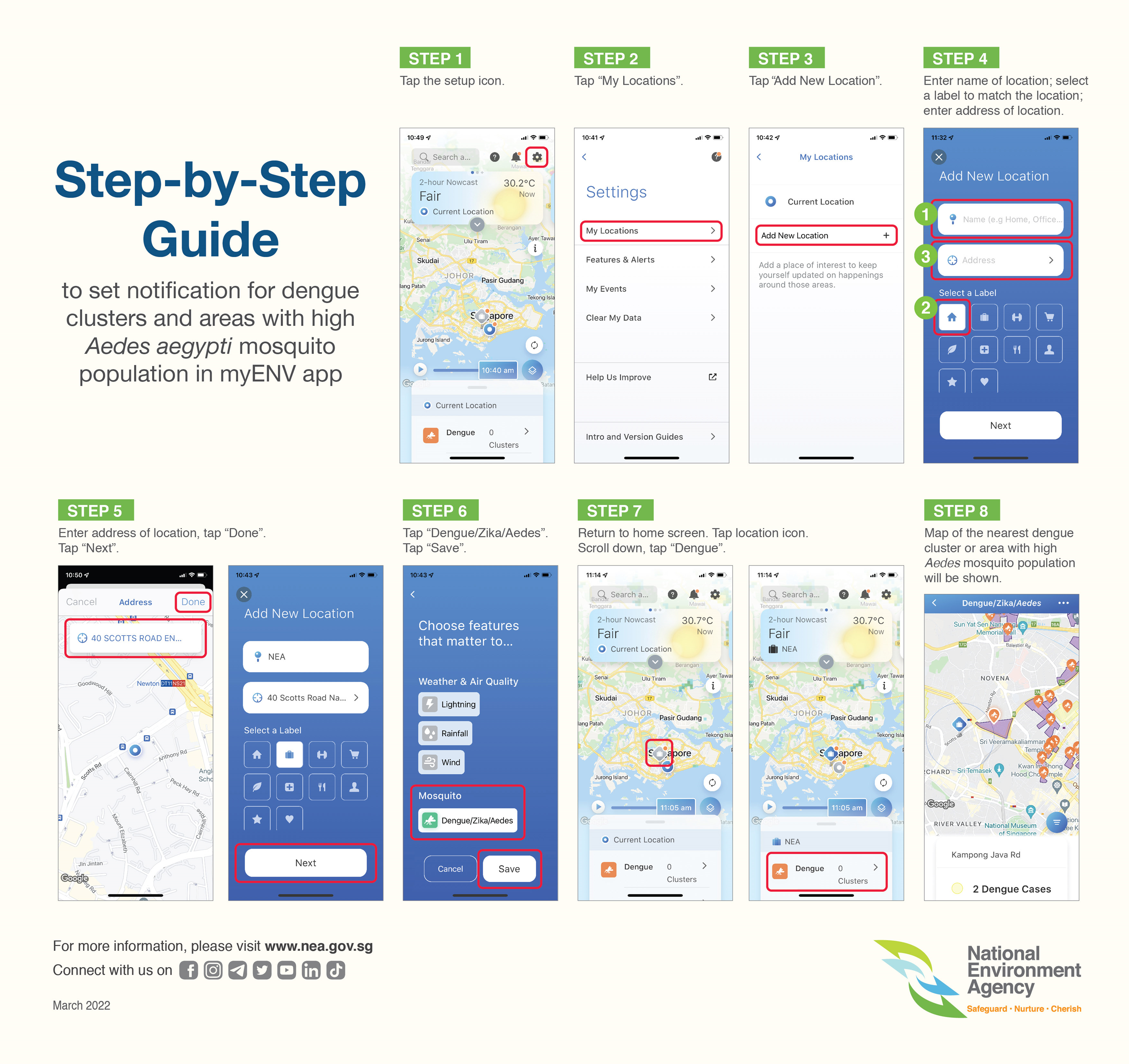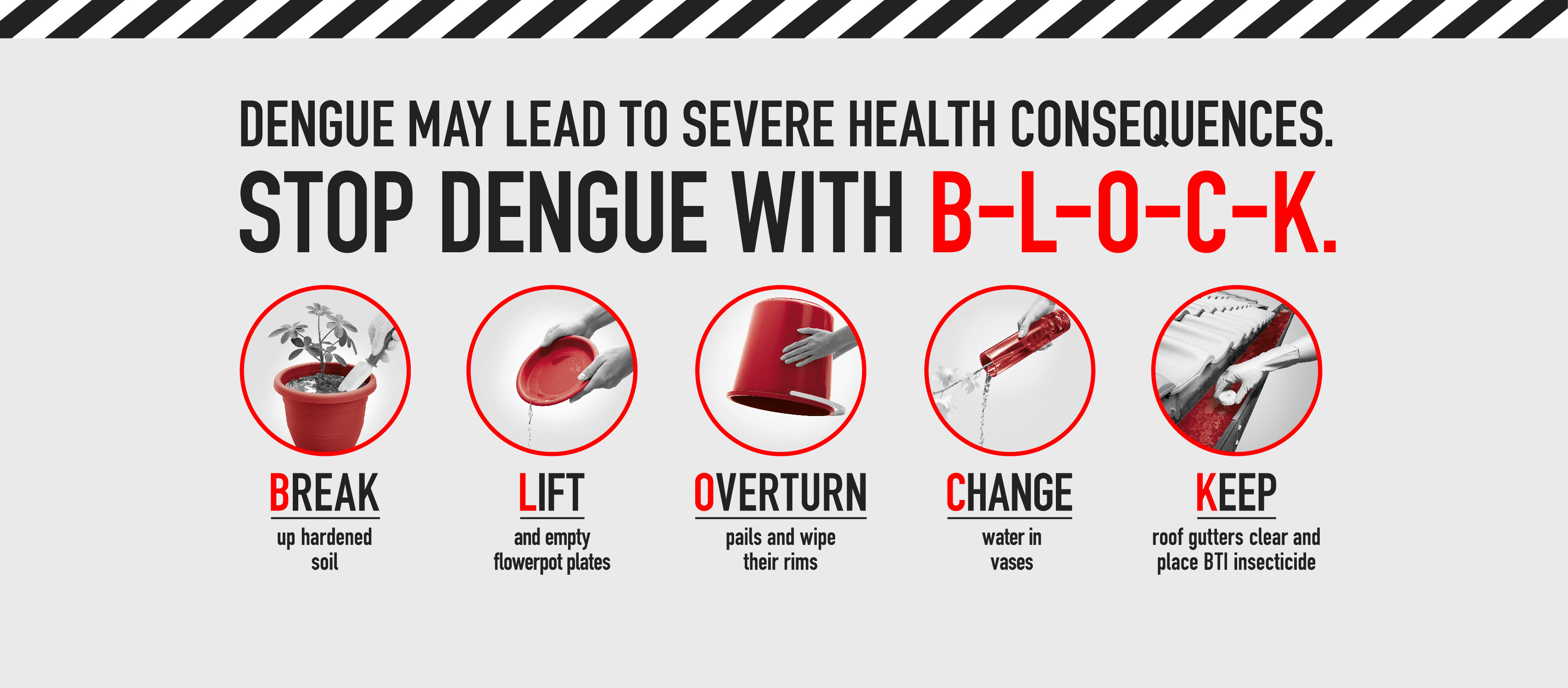Tips and FAQs
TIPS
-
Use mosquito repellent to protect against mosquito bites, even if you are suspected or confirmed with dengue. This prevents mosquitoes from carrying your dengue virus to others.
-
Always test first on a small area of your skin to check for allergies
-
Effective ingredients for mosquito repellents: Deet, Picaridin or IR3535
For more tips and resources, visit here.
FREQUENTLY ASKED QUESTIONS
1. Is insect repellent effective in preventing bites from the Aedes mosquito?
Topical insect repellent, when applied directly into one’s skin or clothing, is effective as it forms a protective barrier against mosquitoes. It protects one from mosquito bites and should be used, especially by people infected with dengue, to prevent the Aedes mosquito from biting an infected person and transmitting the virus to the next person it bites.
Some types of spatial repellents, such as mosquito coil and chemical-based electric vaporisers or emanators, while can also be effective, are dependent on environmental factors such as wind conditions and activities carried out by a person, which may disrupt the “protected space” of such repellents.
Repellents containing DEET (N,N-diethyl-m-toluamide), picaridin or IR3535 as active ingredients are the most effective in repelling mosquitoes.
Besides applying insect repellent, other methods of protecting yourself against mosquito bites include:
-
Spraying insecticide in dark corners around the house (e.g. under the bed/sofa and behind curtains) to kill adult Aedes mosquitoes in areas where they tend to lurk.
-
Wearing long sleeves/pants, as the fabric forms a barrier between the mosquito and one’s skin.
Other preventive measures include installing mosquito screens on windows/doors to keep mosquitoes out of your home, sleeping under a mosquito net (especially during the day since Aedes aeygpti mosquitoes are day-biting) and using an electronic mosquito zapper to kill mosquitoes.
2. How often should I apply the insect repellent?
Reapplication may be needed as recommended on the product label.
3. Can I spray the insect repellent directly on my skin?
The insect repellent can be sprayed/applied onto skin and/or clothing, but do not apply over cuts, wounds or irritated skin. Spray the insect repellent evenly at a distance of 6 – 8 inches (15 – 20 cm) from skin and clothing. Use enough to cover exposed skin. For application to face and lower limbs, spray onto hand and then apply to areas requiring protection. Avoid applying insect repellent on the eyes and mouth. After usage, wash hands with soap and water.
If you or your child have not used the insect repellent before, test on a small area of skin first to ensure there is no allergic reaction.
4. What should I do if the insect repellent is accidentally ingested?
Seek medical advice from a doctor immediately.
5. What should I do if the insect repellent gets into my eyes?
Hold eye open and rinse slowly for 15-20 minutes.
Seek medical advice if the discomfort persists
6. Are natural insect repellents as effective as DEET-based insect repellents?
Repellents containing DEET (N,N-diethyl-m-toluamide), picaridin or IR353 as the active ingredient are more effective and/or have longer mosquito-repelling effects than “natural” repellents that use plant-based extracts, such as citronella, eucalyptus and other essential oils.
7. Is the use of repellent the most effective and best way of preventing being bitten by mosquitoes?
Besides applying insect repellent, other methods of protecting yourself against mosquito bites include:
-
Spraying insecticide in dark corners around the house (e.g. under the bed/sofa and behind curtains) to kill adult Aedes mosquitoes in areas where they tend to lurk.
-
Wearing long sleeves/pants, as the fabric forms a barrier between the mosquito and one’s skin.
-
Other preventive measures include installing mosquito screens on windows/doors to keep mosquitoes out of your home, sleeping under a mosquito net (especially during the day since Aedes aeygpti mosquitoes are day-biting) and using a hand-held electronic mosquito zapper to kill mosquitoes.
-
Another key action to take to prevent mosquito bites is to ensure that we do not create conditions that are favourable for mosquito breeding. We can keep the Aedes mosquito population low by removing all stagnant water and potential mosquito breeding habitats.
8. How can I learn more about dengue and dengue prevention measures?
You may refer to the NEA website. You may also download the myENV app to receive alerts and information on active dengue clusters and areas with high Aedes aegypti mosquito population.

9. I/ my child is allergic to insect repellent. How else can I protect myself/ my child from dengue?
You can prevent yourself/ your child from being bitten by mosquitoes by wearing long sleeves and long pants, and spraying insecticide in dark corners around the house.
You can also prevent mosquito breeding in your home by regularly practising the following Mozzie Wipeout ‘B-L-O-C-K’ steps:


